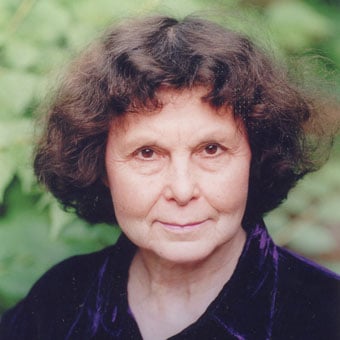
Sofia Gubaidulina
Sofia Asgatovna Gubaidulina was born in the USSR on 24 October 1931 in Chistopol, a small town in the Tatar Autonomous Soviet Socialist Republic, not far to the west of the Ural Mountains which form the natural border between Europe and Asia. Her father was Volga Tatar and a surveyor by profession, her mother of Russian and Polish descent, and the family language was Russian. While the composer was still a child, the family moved to the Tatar capital city of Kazan, and it was there she attended musical school, and then the Kazan Conservatory, studying piano and composition. Graduating in 1954, she transferred to the Moscow Conservatory, where she was taught by Nikolai Peiko and, later, Vissarion Shebalin, finally completing her studies in 1961.
After admission to the Composers’ Union, an essential step for anyone wishing to earn a living writing music in Soviet times, she became a freelance composer, surviving by writing children’s music and, more importantly, film scores. Music for cinema became her main source of income for the next 30 years.
As a young composer in Moscow, Gubaidulina benefited greatly from contact with her peers and from the relatively open cultural atmosphere in the later Khrushchev years. It was at that time that she first established contact with important performers including the percussionist Mark Pekarsky (for whom she wrote many pieces including the percussion concerto The Hour of the Soul, 1976, rev.1988), the bassoonist Valery Popov (Concerto for Bassoon and Low Instruments, 1975) and the free-bass accordionist Friedrich Lips, for whom she composed the solo piece De profundis (1978) and the chamber concerto Seven Words for free-bass accordion, cello and strings (1982), the cello part being for Vladimir Tonkha, another major champion of her music.
Even at this early period, the titles and character of her pieces made strikingly clear Gubaidulina’s fascination with religion, something which caused her trouble with the Soviet authorities, especially when her music was performed abroad. In 1980, she composed her first violin concerto, Offertorium (subsequently twice revised), for Gidon Kremer, who performed the piece widely across the world, thus garnering her international attention and commissions from many performers and orchestras in Western Europe, the USA and in Japan. In 1992, with the collapse of the USSR, she moved to a small village outside Hamburg, Germany, where she has lived ever since.
Her musical output over the last four decades has been astonishing, including a whole sweep of orchestral pieces from late Soviet works like Stimmen… verstummen… (1986) through early works from the post-Soviet period like Zeitgestalten (1994) and The Light of the End (2003) to the recent The Wrath of God (2020), one of her most powerful utterances. She has also completed two more violin concertos, several concertos for cello and many other concertante works including one for her beloved free-bass accordion and another for Japanese instruments with symphony orchestra.
For the composer herself, her choral and orchestral works are especially important, perhaps most of all the massive full-evening diptych of the Johannes-Passion (2000) and its companion piece Johannes-Ostern (2001). But she continues to compose a great deal of chamber music and still relishes her relationships with individual performers.
Over the years, Gubaidulina has been given many prizes, honours and awards, and in 2021, the year of her 90th birthday, there were celebrations of her life and work, in many countries of the world. Her greatest wish, however, remains that she should continue to write music, quietly and at home.
Sofia Gubaidulina is published by Boosey & Hawkes/Sikorski.
This biography can be reproduced free of charge in concert programmes with the following credit: Reprinted by kind permission of Gerard McBurney/Boosey & Hawkes
